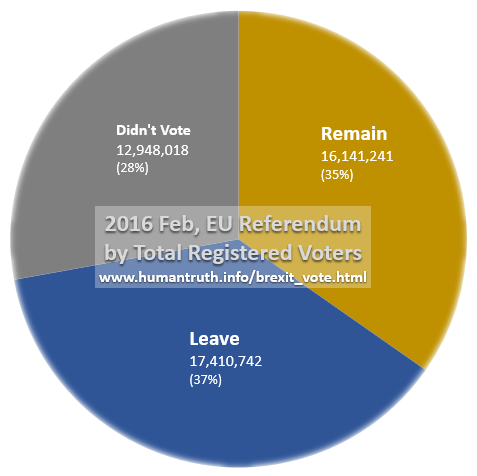The UK's Brexit Vote of 2016
What is the Will of the People?
https://www.humantruth.info/brexit_vote.html
By Vexen Crabtree 2018
 Of the registered electorate of UK nationals, 72.15% voted in the EU referendum in 20161. In general, one third didn't vote, one third voted Remain and one third voted Leave. Between the two active camps, 16 141 241 people voted Remain, and 17 410 742 voted to Leave2 the EU; it was a very close vote, with Leave winning by 2%. Government and news sources often looked at the 35:37 split and scaled it up, misleadingly saying that 52% voted leave3,1 and that this was 'the will of the people', hiding the fact that only 37% voted to Leave. To say "will of the people" is baseless nonsense.
Of the registered electorate of UK nationals, 72.15% voted in the EU referendum in 20161. In general, one third didn't vote, one third voted Remain and one third voted Leave. Between the two active camps, 16 141 241 people voted Remain, and 17 410 742 voted to Leave2 the EU; it was a very close vote, with Leave winning by 2%. Government and news sources often looked at the 35:37 split and scaled it up, misleadingly saying that 52% voted leave3,1 and that this was 'the will of the people', hiding the fact that only 37% voted to Leave. To say "will of the people" is baseless nonsense.
- Of the Total Population, 26% Voted Leave, 25% Voted Remain
- Of the Electorate, 37% Voted Leave, 35% Voted Remain
- UK Brexit from the EU: Disorganized, Unclear and Unprepared
- Links
1. Of the Total Population, 26% Voted Leave, 25% Voted Remain

The number of "not registered" was calculated by taking the Office National Statistics UK population for mid-20164, and subtracting the number of registered voters. This includes children and other UK nationals who were ineligible to vote. Nearly everyone agrees that for voting statistics, it is only sensible to visualize possible voters.
2. Of the Electorate, 37% Voted Leave, 35% Voted Remain

3. UK Brexit from the EU: Disorganized, Unclear and Unprepared
#belgium #brexit #EU #france #netherlands #politics #UK
The UK's population faced a referendum in June 2016 on membership of the EU. The results were very close, with Leave winning by just a 2% margin (37% Voted Leave, 35% Voted Remain), but many news (and government) outlets scale up the difference by ignoring the "don't knows", and citing "Leave" as "the will of the people".
Also in June 2016, the EU appointed Michel Barnier to lead a team of legal experts. A full year later, he complained that the UK had still not appointed a representative to talk to him5. The UK arrived late and unprepared for negotiations, and engaged in a series of embarrassing and harmful name-calling tactics, publicly insulting the very people they were trying to negotiate with6. A month into talks, and Mr Barnier is still trying to ascertain what the UK's stance is on most issues7. The UK government has been surprised by simple facts: It argued that Euratom's treaty only covers uranium even whilst its own scientific advisors cried out that hospitals need Euratom to source medical isotopes from Belgium, the Netherlands and France as the UK doesn't have the specialist nuclear reactors to make its own8. And as July 2017 drew to a close, the UK government finally thought to commission a year-long investigation on the economic and employment ramifications of losing EU workers. Most other responsible governments would have engaged in a fact-finding mission before making the most important decision made for 40 years. Even in 2019, when a last minute "here are the effects you need to prepare for" document was released, the title of the document was "[Insert title of report]".
Brexit within the UK's governing Conservative Party was led by a hard-core of 'Brexiteers' organized into an internal party division called the European Research Group9, borne from a policy of removing as many foreigners as possible from the UK, no matter the cost. To achieve this, they spoke only in positive terms of the ramifications of Brexit and did not have a realistic understanding of the benefits of EU membership for the UK. With this slant, they could not give sensible advice9 nor make practical plans on how to deal with issues arising from Brexit. Most of the prominent "Brexiteers" have exited the scene at various points10, leaving a void filled with politicians who are pursuing a policy they don't think is good for their own country.
It is worth noting that it is not just Conservative politicians who were uninformed about the EU; in 2016 researchers found that the UK's citizens were the least knowledgeable about the EU11. After the vote, data released by Google tragically shows that "the British are frantically Googling what the E.U. is, hours after voting to leave it". The UK has suffered from many high-profile long-term campaigns ran by sensationalist newspapers that have managed to misinform the masses on almost every aspect of EU involvement with the UK12,13.
For more, see: